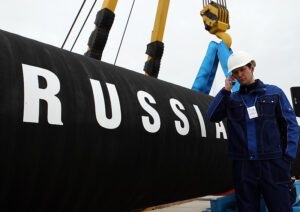
TK-Domashniy Tekstil, part of the Textile-Contact (TK Group) group of companies, significantly increased its exports in December, in particular, it began working with customers from Sweden for the first time, according to the group’s owner, Alexander Sokolovsky.
“December is just beginning, but it has already become a record month for TK-Domashniy Tekstil’s exports: since the beginning of the month, we have shipped seven trucks of our own products to Europe! We have started working with customers from Sweden for the first time, with whom we have contracted our own digitally printed fabrics,” he wrote on Facebook.
It is specified that the designs were provided by the customer, and the Chernihiv Textile Combine (TK-DT Chernihiv) was fully responsible for the manufacture of fabrics and digital printing.
Products were also shipped to a new customer in Romania.
According to Sokolovsky, two trucks went to a new partner in the Baltics with a custom order for mattresses filled with 70% Ukrainian flax.
“The covers for these mattresses were sewn from natural cotton fabric (half-panels), which is also manufactured at our textile production facility,” added the owner of TK Group.
This month, the company made two large shipments to Lithuania—to the DEPO supermarket chain, where two trucks of finished home textile products were delivered, and the next batch is already being prepared.
“In addition, we made another shipment to our regular customer in Georgia, the Domino supermarket chain. This time, it was an expanded range of home textiles under our HomeLine brand with pre-New Year designs,” said Sokolovsky.
At the same time, he noted that currently, TC and many light industry enterprises are facing a problem where even regular customers have been afraid to place orders in Ukraine for the past two years.
“Although it is us who are taking the risk here, not them. Interestingly, this was not the case at the beginning of the full-scale invasion in 2022-2023. On the contrary, many Europeans tried to help Ukrainian entrepreneurs and, even understanding our capabilities, increased their orders despite logistical and other risks. Now, for some reason, it is much more difficult to break through, but we are doing everything possible and impossible,” Sokolovsky emphasized.
TK-Domashniy Tekstil is a leader in the production of fabrics, home textiles, and children’s products in Ukraine. Its asset portfolio includes one of the few finishing factories in Ukraine that produces cotton fabrics in Chernihiv, TK-DT Chernihiv. Its assets also include garment factories in Kyiv, Ternopil, Chernihiv, and Odesa; a shoe factory in Chyhyryn; a knitting factory; and a synthetic winterizer factory in Chernihiv.
The company’s products are imported to Denmark, Germany, Lithuania, Latvia, Georgia, and France.
TK Group was founded in 1995. It is currently a holding company that brings together the entire spectrum of textile industry services, from raw materials and threads to ready-made solutions for B2B, B2G, and B2C customers.
The group consists of 13 factories and employs about 1,500 people.
Since the start of the full-scale war, the group has invested about $14.5 million in development.
The founder of the group is Sokolovsky, chairman of the Light Industry Defense Procurement Committee at the Federation of Employers of Ukraine and a member of the Manifest 42 public movement.

The volume of gas supplies from Russia to Europe has now halved compared to last summer, and their further decline is not ruled out, European Commission energy member Kadri Simson said on Monday.
“Gas deliveries from Russia now make up half of the volumes that we received at the same time last year. They may continue to decline,” Simson said before the EU meeting at the level of ministers of energy, transport and telecommunications.
With regard to gas supplies, the EU is ready for any developments, she stressed.
Simson added that at the meeting on Monday, she will present to the ministers concrete steps that, in her opinion, would help the countries of the union to be better prepared for the reduction in gas supplies. One such step is coordinating a reduction in demand for gas.
On Saturday, Simson said that 12 EU states were completely or partially left without gas from Russia. She added that last week the EU reached an agreement to increase gas supplies with Israel and Egypt, deepened cooperation with Norway, and final direct negotiations with Azerbaijan.
Simson stressed, BNS reports, that joint gas purchases require unanimity and coordination between member states, and that the work of the European Commission creates the necessary conditions for this.
“The good news is that in May, a record was once again set for the flow of LNG to Europe – 12.8 billion cubic meters – this is the largest monthly volume in history,” she said.
At the end of May, it was reported that Poland, Bulgaria, Finland and the Netherlands, due to their refusal to accept the new settlement system, had lost the opportunity to receive Russian gas.

Nissan Motor Ukraine, a subsidiary of the Japanese corporation Nissan Motor, has resumed deliveries of spare parts, motor oils and accessories to Ukraine from European warehouses, the company said in a press release.
“At the beginning of the resumption of operations of Nissan Motor Ukraine, the dealer network worked with spare parts that were delivered to Ukraine before February 24. But the high demand for maintenance and the efficient work of the Ukrainian representative office with the European head office of Nissan made it possible to arrange the supply of spare parts, motor oils, consumables and accessories in a much larger volume.
As reported, in April, Nissan Motor Ukraine resumed sales and maintenance of Nissan cars in the official dealer network.
The press service of the company also said that all recommended retail prices in the dealer network for spare parts, oils and consumables are fixed at the rate of UAH 33/EUR 1, deliveries of original accessories at fixed prices have begun.
“Nissan’s dealer network in Ukraine operates in almost all regions where there are dealers, even in Kharkiv, where until recently there were battles. The exceptions are Mykolaiv, Kherson, Kramatorsk and Mariupol,” the press service said.
In addition, for customers who have traveled abroad with their Nissan car, the pan-European warranty continues to be valid.

From day to day Ukraine expects deliveries of gasoline from the state reserve of Poland, which were supposed to cover a quarter of consumption in May.
This was announced by First Deputy Minister of Economy of Ukraine Denys Kudin during the talk show “Ukrainian Petroleum Products Market: Temporary Crisis or Large-Scale Collapse?” organized by the Energy Club on Monday.
According to him, unlike diesel fuel, the volumes of gasoline imports into the country currently do not cover the volumes of its consumption.
“And here we are counting on the help of our European partners, in particular, the Polish state reserve, which promised to give us approximately a quarter of the consumption in May. We are expecting this supply from day to day,” Kudin said.
At the same time, according to him, the volume of imports of diesel fuel to Ukraine is currently 20% higher than the volume of its consumption.
“This is enough for the buyer, after standing in line, to be able to fill his tank, albeit with restrictions, but 20 liters, but not enough to remove the queue,” the first deputy economy minister said.
In his opinion, the reason for the preservation of queues at gas stations for buyers of diesel fuel is its low stocks from operators – 3-5 days of sale instead of the previous 15-20 days. At the same time, individual operators do work “from the wheels.”
Nevertheless, as the First Deputy Minister emphasized, in the first half of May, at a meeting with European partners on providing Ukraine with fuel, decisions were made that give Kyiv the opportunity to look to the future with optimism.
“However, you need to understand: the war continues, the enemy is systematically destroying our infrastructure … The enemy is destroying the railway, so we all need to be patient and gradually rebuild our consumption,” Kudin said.
According to the Ministry of Economy, Russian aggressors have destroyed 27 oil depots in Ukraine since the beginning of the war.
As reported, according to the updated forecast of the Ministry of Economy, consumption of 300,000 tonnes of diesel and 120,000 tonnes of gasoline is expected in May. The ministry noted that such a volume of imports has already been contracted by Ukrainian chains.

In January-June of this year, the Ukrainian industrial company Interpipe increased supplies of Oil Country Tubular Goods (OCTG) to the United States due to a surge in activity in the oil and gas sector amid rising prices for hydrocarbons, First Deputy CEO of Interpipe Denys Morozov has said in an interview with Metal Expert publication.
According to him, this is a positive moment – American companies have resumed drilling, and now is the “right time” for Interpipe to increase supplies of threaded OCTG pipes, including premium and semi-premium products.
“We are actively engaged in its production and promotion. In the first half of 2021, Interpipe has already increased the supply of OCTG pipes to the United States. We expect that positive dynamics will continue in the second half of this year,” Morozov said.
At the same time, he pointed out a number of restrictions on the supply of pipes to the United States. Thus, the U.S. Department of Commerce intends to impose duties on seamless line pipes at a rate of 23.75%.
At the same time, he said that Interpipe continues supplies to the U.S. market, but in the future it will study their economic efficiency with the hope that new relations will be built with new U.S. President Joe Biden. Accordingly, Ukraine will be able to re-start negotiations on the abolition of section 232, which is a significant barrier to the growth of supplies.
The first deputy CEO added that last year the company took a number of steps to promote its products in the Middle East region, the goal is to get into the league of premium pipe suppliers.
“In the Middle East, we continue to implement our strategy aimed at expanding our presence, looking for new niches, customers and increasing supplies. This year we plan to complete prequalification from the Emirati giant ADNOC. In general, the Middle East is a region with traditionally stable oil production and stable pipe consumption. Therefore, it is only natural that we expect sales growth in both segments: both OCTG and line pipes,” Morozov said.
According to him, the main problem in the markets of the countries of Central Asia is great difficulties with financing projects, since local companies do not have enough money to implement all projects at once. Now, amid high oil prices, the financing situation has improved somewhat. Accordingly, pipe consumers in Uzbekistan, Turkmenistan and Azerbaijan resumed purchases. The positive dynamics is expected to continue in the second half of the year.
Concerning supplies to the EU, he said that at the moment it is impossible to increase sales to the EU countries due to quotas, despite the presence of deferred demand in this market. The company chooses the pipe quota allocated to Ukraine, but after its use the supplies stop. From time to time it is possible to use part of the other countries quota, but these are small amounts.
In Ukraine, Interpipe has completed several contracts for the supply of UPJ-M, UPJ-P and UPJ-F premium pipes for domestic private oil and gas companies. But the volume of drilling and consumption of OCTG pipes in the country increased insignificantly.
In 2021, the volume of supplies to the Ukrainian market did not decrease. Moreover, it is likely that even a slight increase will be recorded by the end of the year. But if we compare with the results of 2018-2019, then consumption has not yet returned to the pre-crisis level. For example, if in 2018 Ukrgazvydobuvannia purchased about 70,000 tonnes of threaded pipes, and half of them were of premium assortment, now the total consumption by this state-owned company is 20,000 tonnes.
“We hope that the current relatively high gas prices will stimulate oil and gas companies to increase the volume of drilling and consumption of our pipes. Perhaps, in the second half of the year we will see improvements, but so far these are only our forecasts,” Morozov said.
According to the expert, there is no significant growth in the machine-building segment either; consumption by machine-building companies is correlated with the growth / decline of the country’s GDP. Interpipe does not forecast any sharp surges until the end of the year, so the sales of machine-building pipes are likely to remain at last year’s level.
The market is expected to stabilize in the near future and the Novomoskovsk plant will resume normal operations. In turn, the company sold a record amount of steel billets to third customers this year.